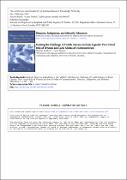| dc.contributor.author | Kendrick, Maureen | |
| dc.contributor.author | Mutonyi, Harriet | |
| dc.date.accessioned | 2018-08-28T17:43:12Z | |
| dc.date.available | 2018-08-28T17:43:12Z | |
| dc.date.issued | 2007 | |
| dc.identifier.citation | Kendrick, M. and Mutonyi, H., 2007. Meeting the challenge of health literacy in rural Uganda: The critical role of women and local modes of communication. Diaspora, Indigenous, and Minority Education, 1(4), pp.265-283. | en_US |
| dc.identifier.uri | http://hdl.handle.net/20.500.12280/573 | |
| dc.description.abstract | This article seeks to better understand the relation between local and traditional
modes of communication and health literacy within the context of a rural West Nile
community in Northern Uganda. Drawing on social semiotics (multimodality) and
Bakhtin’s notion of the carnival, the focus is on a group of women participating
in a grassroots literacy program and their use of local modes of communication to
address the endemic problem of malaria in the West Nile region of Uganda. The
argument is that women and local modes of communication can serve a critical role
in disseminating primary health care information in particular and in community
health care development in general. This article also makes a case for adopting a
more holistic approach to health literacy promotion; one that brings together local
and new modes of communication and knowledge with desperately needed health
care services and trained personnel. | en_US |
| dc.language.iso | en | en_US |
| dc.publisher | Diaspora, Indigenous, and Minority Education | en_US |
| dc.subject | Challenge of Health Literacy in Rural Uganda | en_US |
| dc.subject | The Critical Role of Women | en_US |
| dc.subject | Modes of Communication | en_US |
| dc.title | Meeting the Challenge of Health Literacy in Rural Uganda: The Critical Role of Women and Local Modes of Communication | en_US |
| dc.type | Article | en_US |


